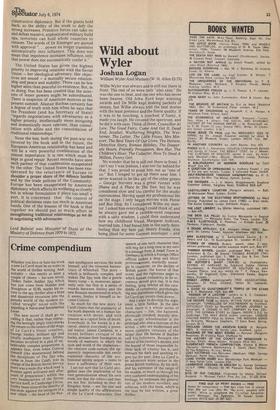Crime compendium
Whether you love or hate his work a new Le Carre must be an event in the world of thriller writing. And, suitably — this merits at least a couple of cheers — his•new novel, Tinker, Tailor, Soldier, Spy, which has just come from Hodder and Stoughton at £2.95, marks his return to the spy thriller after a brief and disastrous excursion into the Pseudo world of the modern socalled 'straight' novel with the appalling A Naive and Sentimental Lover.
The new novel (I shall go on calling it that, rather than repeating the boringly jingly title) marks the return to the centre of the stage of Le Carre's finest creation, George Smiley, brilliant spy and totally inadequate man. Smiley becomes involved in a plot of unbelievably complex proportions: it appears that, even when Control himself (the mastermind behind the deceptions of The Spy who came in from the Cold), was in charge of the British Secret Service there was a mole (for which read 'a Russian agent activated only after Years of preparation') within the verY headquarters of the Secret Service itself, in Cambridge Circus. Smiley must unravel the identity of this mole, against the intrigues of a new villain — the head of the Rus sian intelligence services; the mole himself; and the tiresome bureaucracy of Whitehall. This story — which is brilliantly complex, and makes The Spy look like a gentle Henty romp — is, moreover, apparently only the first in a series of rounds between Smiley and the new Russian mastermind in which, it seems,. Smiley is himself to become Control.
So much for the new story. Le Carre claims that the popularity of his workdepends on a human tascination with deceit, and with treason as a capital form of deceit. Everybody in his books is a deceiver, almost everybody a potential traitor. James Cameron, in a recent brilliant critique of the books, stresses their fascination as novels of manners, in which thestyle and world of the characters— the obscure code-names, the apparently impenetrable but easily explained obscurity of the professional spying jargon — come to have a sufficiency of their own.
I am not sure that Le Cat-re altogether sees the implication of his own generalisation about his own work; nor that the critics—and they are not few, including as they do Kingsley Amis — see the real and simple quality of the affirmations of the Le Carre characters. One
speech of one such character that will ring for a long time in my ears is a passage from A Small Town in Germany in which a Foreign Office official makes a deep and bitter pronoungement, markedly nostalgic in character, on the decline of British power, the horror of that event, and the righteous anger to which human complicity in its occurence should give rise. It is this feeling, lying behind all the taradiddle of complexity, psychologising and shabbiness which gives the Le Carre spy novels their power.
And I want to develop the argument a little further. In the new book there is a whole series of characters — Jim, the battered, physically crooked, morally integral, ex-spy schoolteacher is the principal one, and a tuIcrum of the action — who are modernised and more complex versions of the larger than life heroes of Buchan and his followers. Beneath the hatred of his country's decline, and the hatred of those responsible by their lack of vitality for it, and beneath his dark and seething regret for the past, John Le Carreis an adventure .story writer in the grand British tradition. By his skill, and his extension of the range of his models, as much as through his own confused understanding of his heritage, he surpasses the general run of the modern novelists, and achieves, with this book, which is the' best he has written, a great thriller.


































 Previous page
Previous page